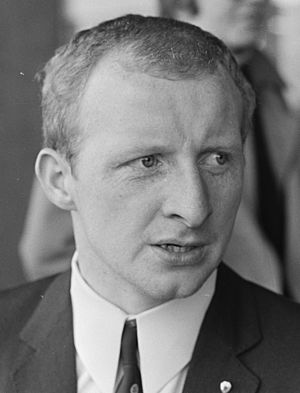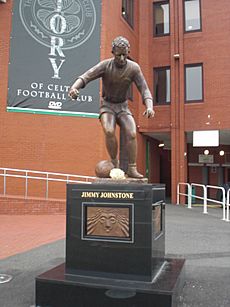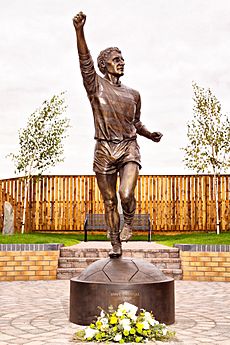Jimmy Johnstone facts for kids

Johnstone in Amsterdam (1971)
|
|||
| Personal information | |||
|---|---|---|---|
| Full name | James Connolly Johnstone | ||
| Date of birth | 30 September 1944 | ||
| Place of birth | Viewpark, Scotland | ||
| Date of death | 13 March 2006 (aged 61) | ||
| Place of death | Uddingston, Scotland | ||
| Height | 1.62 m (5 ft 4 in) | ||
| Position(s) | Outside right | ||
| Youth career | |||
| 1958–1959 | Celtic | ||
| 1959–1961 | Viewpark Boys Guild | ||
| 1961–1962 | Celtic | ||
| 1961–1962 | → Blantyre Celtic (loan) | ||
| Senior career* | |||
| Years | Team | Apps | (Gls) |
| 1962–1975 | Celtic | 308 | (82) |
| 1975 | San Jose Earthquakes | 10 | (0) |
| 1975–1977 | Sheffield United | 11 | (2) |
| 1977 | Dundee | 3 | (0) |
| 1977–1978 | Shelbourne | 9 | (0) |
| 1978–1979 | Elgin City | 18 | (2) |
| Total | 359 | (149) | |
| International career | |||
| 1964 | Scotland U23 | 2 | (0) |
| 1964–1974 | Scotland | 23 | (4) |
| 1964–1970 | Scottish League XI | 4 | (0) |
| *Club domestic league appearances and goals | |||
James Connolly Johnstone (born September 30, 1944 – died March 13, 2006) was a famous Scottish footballer. He was known by his nickname "Jinky". He played as an outside right, which is a type of forward player.
Jinky played for Celtic for 13 years. He was a key part of the legendary "Lisbon Lions" team. This team won the European Cup in 1967. They also won 9 Scottish championships in a row! Johnstone scored 129 goals for Celtic in 515 games. He also played 23 times for the Scottish national team.
In 2002, Celtic fans voted him their greatest player ever. He was also recognized as one of the best players in Europe. In 2004, he joined the Scottish Football Hall of Fame. Many people think Jinky was one of the best wingers in football history. He was known for his amazing dribbling skills. He made playing football look like magic!
Contents
Early Life and Youth Football Career
Jimmy Johnstone was the youngest of five children. He grew up in Viewpark, Scotland. His amazing football skills were first noticed when he played for his primary school team. They won three trophies in 1953–54.
His physical education teacher, Tommy Cassidy, knew Sammy Wilson. Sammy played for Celtic at the time. Cassidy helped Jimmy become a ball boy for Celtic.
At home, Jimmy practiced his skills every day. He would dribble a football around milk bottles for hours. He also read that famous player Stanley Matthews wore heavy boots to make his legs stronger. So, Jimmy started wearing heavy work boots to sprint and play football. He later said this made him much faster!
Even though he was a ball boy for Celtic, Jimmy wanted to play. He left Celtic to play for his local team, Viewpark Boys Guild. His talent caught the eye of Manchester United's youth team. But when he returned to Scotland, a Celtic scout convinced him to sign with Celtic. He signed on the same day as Tommy Gemmell, who would also become a Celtic legend. To get more experience, Jimmy was sent to play for a junior club called Blantyre Celtic.
Club Football Career
Playing for Celtic
Jimmy Johnstone played his first game for Celtic on March 27, 1963. It was a tough game, and Celtic lost 6–0. A month later, he scored his first goal for the senior team. He played in the Scottish Cup Final against Rangers. He played very well, helping Celtic get a 1–1 draw. He even scored a goal, but it was not allowed. Sadly, he was not picked for the replay, and Celtic lost 3–0.

The next season, Jimmy became a regular player for Celtic. He played in 25 league games and scored six goals. He also helped Celtic reach the semi-finals of the European Cup Winners' Cup. He scored against FC Basel and MTK Budapest. But Celtic lost in the second leg and were knocked out.
Celtic was not doing very well in the early 1960s. That changed when Jock Stein became manager in 1965. At first, Stein wasn't sure about Jimmy. He thought Jimmy played too much on his own. He even left him out of the 1965 Scottish Cup Final team. But Jimmy's amazing skills soon changed Stein's mind.
Jimmy won his first medal on October 23, 1965. He played in Celtic's 2–1 win over Rangers in the Scottish League Cup Final. That season, he played 32 league games and scored nine goals. This helped Celtic win their first league title in 12 years. Jimmy also helped Celtic reach another European semi-final. They lost to Liverpool in the Cup Winners' Cup.
Jimmy Johnstone was one of the "Lisbon Lions". This was the famous Celtic team that won the European Cup in 1967. In a game against Nantes, the French newspapers called Jimmy "the Flying Flea" because of his quick moves. His great performances that season helped him finish third in the European Footballer of the Year award.
Two weeks after winning the European Cup, Celtic played Real Madrid in a special game. It was a testimonial match for the retired player Alfredo Di Stéfano. Over 100,000 fans watched the game. Jimmy Johnstone was the star of the show. His amazing play made the Spanish fans chant "Olé!" He also set up the only goal for Bobby Lennox in Celtic's 1–0 win.
Jimmy had a big fear of flying. Manager Jock Stein once used this to motivate him. Before a European game against Red Star Belgrade in 1968, Stein told Jimmy that if Celtic won by four goals, he wouldn't have to fly to Yugoslavia for the second game. Jimmy played incredibly well, scoring twice and helping with three other goals in a 5–1 win!
He helped Celtic reach another European Cup Final in 1970. His performance against Leeds United in the semi-final was amazing. He made a fantastic run that led to Bobby Murdoch scoring the winning goal. Leeds defender Terry Cooper joked, "I would love to have kicked Jinky, but I couldn't get near him!" Celtic played Feyenoord in the final. But Feyenoord marked Jimmy very closely, and Celtic lost 2–1 after extra time.
In total, Jimmy played 308 league games for Celtic, scoring 82 goals. He played 515 matches for them in all competitions. He was also nominated for the Ballon d'Or again in 1968 and 1969.
Later Football Career
After leaving Celtic, Jimmy played for several other teams. These included the San Jose Earthquakes in the USA, Sheffield United, Dundee, Shelbourne, and Elgin City. His manager at Dundee was his former teammate Tommy Gemmell. However, Jimmy later said his "heart was not in it" after leaving Celtic. He found it hard to be motivated to play for other clubs.
International Football Career
Jimmy Johnstone started his international career on February 5, 1964. He played for the Scottish Under 23 team against England U23s. He made one more appearance for the U23 team that year.
He made his debut for the main Scottish international side on October 3, 1964. This was in a game against Wales. He helped create Scotland's second goal, but they lost 3–2. His next game was a World Cup qualifier against Finland. Scotland won 3–1, but Jimmy's performance was not his best.
Jimmy did not play for Scotland again until April 2, 1966. In that game, he scored his first two international goals against England. Scotland lost 4–3, but Jimmy was one of their best players. He scored his next international goal in October 1969 against West Germany.
In May 1974, before the 1974 FIFA World Cup, Jimmy and his Scotland teammates were involved in an incident. Jimmy decided to go out in a rowing boat. But the boat had no oars, and the tide carried him out to sea! The Coastguard had to rescue him. This incident made headlines for days. Despite this, Jimmy played brilliantly for Scotland against England, helping them win 2–0. Jimmy was part of the Scotland squad for the 1974 World Cup, but he did not play in any games.
In total, Jimmy Johnstone played 23 games for Scotland.
Later Life and Legacy
After his playing career, Jimmy faced some personal challenges. In 1992, a Celtic fan named Willie Haughey helped him. They became close friends.
A documentary film about Jimmy's life was made in 2004. It was called Lord of the Wing. It was narrated by famous comedian Billy Connolly.
Jimmy Johnstone was diagnosed with motor neuron disease (MND). He passed away in March 2006, at the age of 61. Thousands of fans, including supporters of rival teams like Rangers, paid tribute to him. This happened outside Celtic Park on the day of his funeral. Before the 2006 Scottish League Cup Final, there was a minute of applause for him. The entire Celtic team wore the number 7 on their shorts to honor him.
In 2008, a bronze statue of Jimmy Johnstone was put up at the main entrance to Celtic Park. It was made by Kate Robinson. In 2011, another statue of Jimmy and a memorial garden were created at his old school in Viewpark. This statue was made by sculptor John McKenna.
Career Statistics
Club
| Club | Division | Season | League | Cup | League Cup | Continental | Other1 | Total | ||||||
|---|---|---|---|---|---|---|---|---|---|---|---|---|---|---|
| Apps | Goals | Apps | Goals | Apps | Goals | Apps | Goals | Apps | Goals | Apps | Goals | |||
| Scotland | League | Scottish Cup | League Cup | Europe | Other | Total | ||||||||
| Celtic | Scottish Division One | 1962–63 | 4 | 1 | 1 | 0 | 0 | 0 | 0 | 0 | 0 | 0 | 5 | 1 |
| 1963–64 | 25 | 6 | 4 | 2 | 2 | 0 | 7 | 2 | 4 | 0 | 42 | 10 | ||
| 1964–65 | 24 | 1 | 1 | 0 | 10 | 3 | 4 | 0 | 1 | 0 | 40 | 4 | ||
| 1965–66 | 32 | 9 | 7 | 1 | 8 | 1 | 7 | 3 | 0 | 0 | 54 | 14 | ||
| 1966–67 | 25 | 13 | 5 | 0 | 10 | 1 | 9 | 2 | 2 | 0 | 51 | 16 | ||
| 1967–68 | 29 | 5 | 1 | 0 | 8 | 5 | 2 | 0 | 5 | 1 | 45 | 11 | ||
| 1968–69 | 31 | 5 | 6 | 2 | 8 | 0 | 5 | 2 | 0 | 0 | 50 | 9 | ||
| 1969–70 | 27 | 10 | 4 | 1 | 6 | 0 | 9 | 0 | 0 | 0 | 46 | 11 | ||
| 1970–71 | 30 | 8 | 8 | 2 | 9 | 5 | 4 | 4 | 1 | 0 | 52 | 19 | ||
| 1971–72 | 23 | 9 | 2 | 0 | 8 | 1 | 6 | 0 | 1 | 0 | 40 | 10 | ||
| 1972–73 | 22 | 7 | 7 | 2 | 7 | 1 | 3 | 0 | 2 | 3 | 41 | 13 | ||
| 1973–74 | 15 | 3 | 2 | 1 | 9 | 1 | 6 | 3 | 0 | 0 | 32 | 8 | ||
| 1974–75 | 19 | 5 | 0 | 0 | 7 | 3 | 2 | 0 | 3 | 1 | 31 | 9 | ||
| Total | 306 | 82 | 48 | 11 | 92 | 21 | 64 | 16 | 19 | 5 | 529 | 135 | ||
1Includes Glasgow Cup, the 1967-68 Intercontinental Cup, and Drybrough Cup
International Appearances
| Scotland national team | ||
|---|---|---|
| Year | Apps | Goals |
| 1964 | 2 | 0 |
| 1965 | — | |
| 1966 | 2 | 2 |
| 1967 | 2 | 0 |
| 1968 | 1 | 0 |
| 1969 | 2 | 1 |
| 1970 | 2 | 0 |
| 1971 | 4 | 0 |
| 1972 | 2 | 0 |
| 1973 | — | |
| 1974 | 6 | 1 |
| Total | 23 | 4 |
International Goals
- Scores and results list Scotland's goal tally first.
| # | Date | Venue | Opponent | Score | Result | Competition |
|---|---|---|---|---|---|---|
| 1 | 2 April 1966 | Hampden Park, Glasgow | 2–3 | 3–4 | 1965–66 British Home Championship | |
| 2 | 2 April 1966 | Hampden Park, Glasgow | 3–4 | 3–4 | 1965–66 British Home Championship | |
| 3 | 22 October 1969 | Volksparkstadion, Hamburg | 1–0 | 2–3 | 1970 World Cup Qualifiers | |
| 4 | 1 June 1974 | Klokke Stadion, Bruges | 1–1 | 1–2 | Friendly match |
Honours and Achievements
- Club
- Scottish First Division (9): 1965–66, 1966–67, 1967–68, 1968–69, 1969–70, 1970–71, 1971–72, 1972–73, 1973–74
- Scottish Cup (4): 1966–67, 1970–71, 1971–72, 1973–74
- Scottish League Cup (5): 1965–66, 1966–67, 1968–69, 1969–70, 1974–75
- European Cup : 1967
- Runner-up 1970
- Individual
- Ballon d'Or (3rd place): 1967
See also
 In Spanish: Jimmy Johnstone para niños
In Spanish: Jimmy Johnstone para niños
 | Selma Burke |
 | Pauline Powell Burns |
 | Frederick J. Brown |
 | Robert Blackburn |


